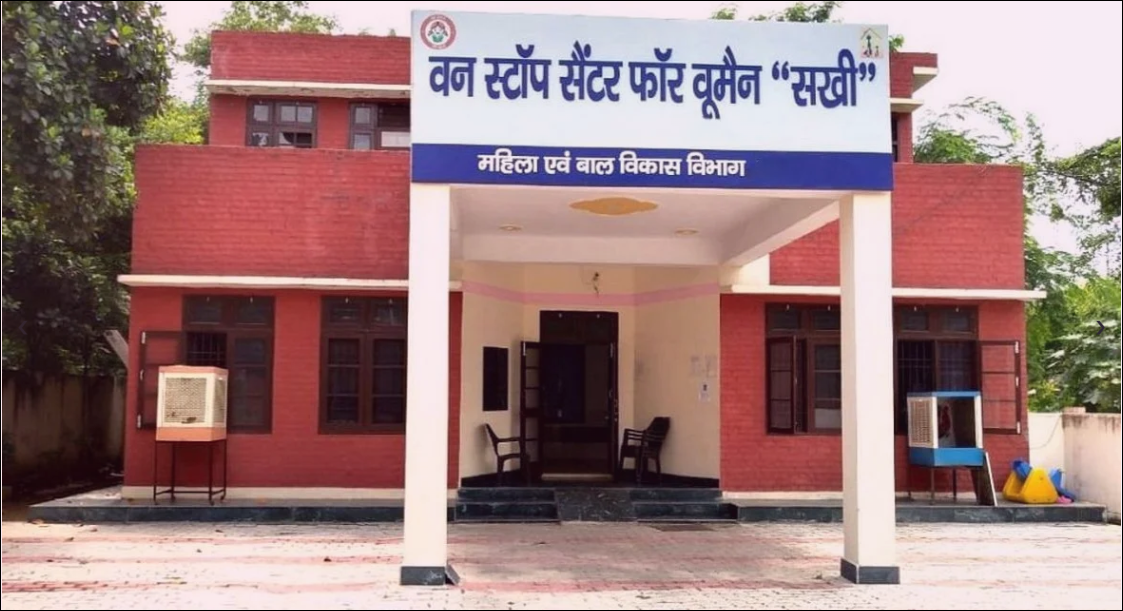The One Stop Centre Scheme, also known as ‘Sakhi‘ was launched by the Ministry of Women and Child Development (MWCD). It was implemented on 1st April 2015.
One Stop Centres (OSCs) are designed to assist women who have experienced violence in various settings, including private and public spaces, within their families, communities, and workplaces.
They offer support and redress to women enduring physical, sexual, emotional, psychological, or economic abuse, regardless of their age, class, caste, educational background, marital status, race, or cultural background.

One Stop Centre Scheme Details:
- One Stop Centre Scheme (OSCS) was launched on 1st April 2015 by the Ministry of Women and Child Development (MWCD). It was launched as a part of the National Mission for Empowerment of Women (NMEW).
- The aim is to provide medical, legal, psychological, and counselling support to female victims in the same place.
- One Stop centres are staffed with doctors, counsellors, lawyers, and other professionals.
- There were 770 operational One Stop Centres (OSCs) in India.
| Scheme Name | One Stop Centre |
| Launch Date | 1st April 2015 |
| Launch By | Central Government |
| Department | Ministry of Women and Child Development |
| Target beneficiaries | Women affected by abuse |
| Objective | To facilitate immediate support under one roof to fight against any forms of violence against women |
One Stop Centre Scheme Services List:
One Stop Centre services generally encompass:
- Crisis Support: Immediate help for women in urgent situations, including access to shelters and medical care.
- Therapeutic Counseling: Psychological support to assist women in dealing with trauma.
- Legal Support: Guidance and assistance with legal matters, including help in filing complaints and seeking justice.
- Healthcare Services: Medical attention for injuries and reproductive health needs.
- Peer Support Groups: These are organized groups that provide a platform for women to share their experiences and support each other.
- Resource Referrals: Connections to additional resources, such as financial aid, housing assistance, or vocational training.
- Personal Safety Planning: Creating tailored safety strategies to enhance the well-being of women.
- Advocacy Services: Support in accessing social services and promoting the rights of women experiencing violence.
These services are designed to offer holistic support to women affected by various forms of violence.
One Stop Centre Scheme Helpline:
You can access One Stop Centre by calling the Women Helpline. It can be contacted through a single universal toll-free number 181 across the country. Individuals can call this number for assistance, information, or support.
One Stop Centre Scheme Eligibility:
All women face physical, sexual, emotional, psychological, and economic abuse at home or in public irrespective of age, class, caste, education status, marital status, race, and culture.
One Stop Centre Scheme Required Documents:
No documents are required for the application. You may carry your valid Identification card.
List of One Stop Centre?
You can refer the official link to get details of all One Stop Cetnre.
One Stop Centre Scheme Official Link. Click here
How to get assistance from One Stop Centre?
A woman facing violence can seek help under the One Stop Centre Scheme (OSC) in several ways:
- Directly: She can approach the OSC on her own.
- Through Others: Assistance can be sought by anyone, including concerned citizens, public officials, family members, friends, NGOs, or volunteers.
- Women Helpline: She can reach out via the Women Helpline, which connects with police, ambulance services, and other emergency responders.
After a complaint is filed, a text message (SMS or Internet) will be dispatched to the relevant district authorities, such as the District Protection Officer (DPO), Protection Officer (PO), Child Development Project Officer (CDPO), Station House Officer (SHO), District Magistrate (DM), Superintendent of Police (SP), Deputy Superintendent of Police (DYSP), Chief Medical Officer (CMO), or others as necessary.
When a woman in distress, or someone representing her, seeks help at the OSC, her case details will be documented in a specific format, and a Unique ID Number will be assigned for tracking purposes.
One Stop Centre Staff Salary:
The salaries of One Stop Centre staff can vary widely depending on factors such as location, position, experience, and the specific organization. Typically, roles may include:
- Centre Manager: Generally earns a higher salary due to administrative responsibilities.
- Counselors: Salaries can vary based on qualifications and experience in mental health support.
- Legal Advisors: Compensation is often reflective of legal expertise and years of practice.
- Medical Staff: Salaries depend on healthcare qualifications and roles.
- Support Staff: Entry-level positions may have lower salaries but are essential for operations.
For specific figures, it’s best to refer to local government guidelines or organizational policies about the One Stop Centre Scheme, as they may provide standardized pay scales.
There are other schemes as well designed for women’s welfare like Beti Bachao Beti Pdhao, Sukanya Samriddhi Yojana, Majhi Ladki Bahin Scheme etc.
Frequently Asked Questions
1: What is one stop centre scheme launch date?
The One Stop Centre Scheme, also known as ‘Sakhi‘ was launched by the Ministry of Women and Child Development (MWCD). It was implemented on 1st April 2015.
2: Who runs Sakhi One Stop Centre?
One Stop Centre scheme is funded by the Union government, and it is implemented by state governments. Each state follows a different process when it comes to the set-up and operations of OSCs.
3: How many one stop centres are there in India?
There were 770 operational One Stop Centres (OSCs) in India.
4: What is the Sakhi scheme?
One-Stop Centre Scheme is also known as Sakhi. It is designed to assist women who have experienced violence in various settings, including private and public spaces, within their families, communities, and workplaces.